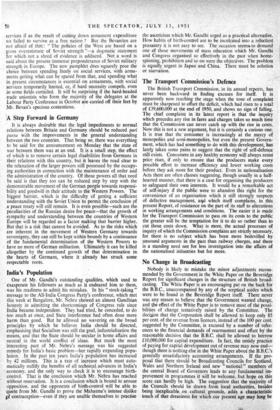The Transport Commission's Defence
The British Transport Commission, in its annual reports, has never been backward in finding excuses for itself. It is apparently now reaching the stage when the tone of complaint must be sharpened to offset the deficit, which had risen to a total of £39,600,000 at the end of 1950, and shows no sign of falling. The chief complaint in its latest report is that the inquiry which precedes any rise in fares and charges takes so much time that the Commission can never catch up with the rise in costs. Now this is not a new argument, but it is certainly a curious one. It is true that the consumer is increasingly at the mercy of Monopolies and semi-monopolies, but even the present Govern- nient, which has had something to do with this development, has lately taken some pains to suggest that the right of self-defence still exists. Consumers in any healthy economy will always resist price rises, if only to ensure that the producers make every possible effort to increase efficiency and lower working costs before they ask more for their product. Even in nationalisation Acts there are often clauses suggesting, though usually in a half- hearted manner, that there is a case for organising the producers to safeguard their own interests. It would be a remarkable act of self-injury if the public were to abandon this right for the convenience of an organisation which it still strongly suspects of defective management, aqd which itself complains, in this present Report, of resistance on the part of its staff to alterations in working arrangements and conditions. The easier it is made for the Transport Commission to pass on its costs to the public the greater will be the temptation for it to do so rather than to cut those costs down. What is more, the actual processes of inquiry of which the Commission complains are strictly necessary, for there is no subject which has been more bedevilled by unsound arguments in the past than railway charges, and there is a standing need not for less investigation into the affairs of the nationalised industries but for more.






































 Previous page
Previous page